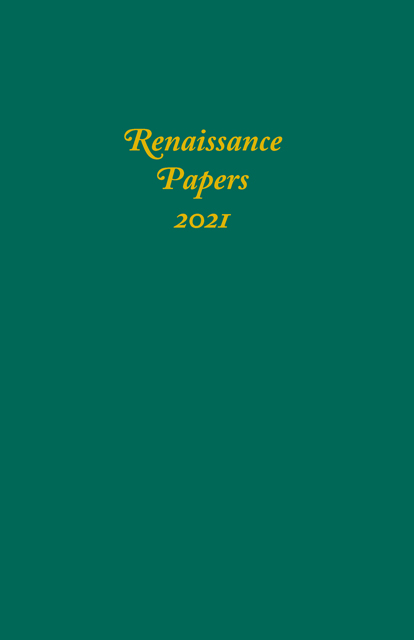Book contents
- Frontmatter
- Contents
- Dedication
- “Strange Serious Wantoning”: Early Modern Chess Manuals and the Ethics of Virtuous Subterfuge
- “Both Use and Art”: Motifs and Method in Astrophil and Stella
- Embodied Love(rs): Injury and Comedy in Mary Wroth’s Urania
- Edmund Spenser’s Automaton Alchemy: The Case of False Florimell
- Who Edited the 1571 Mirror for Magistrates?
- Statues Living and Conscious: Hermetic Statue-Magic in The Winter’s Tale
- Transmutation and Refinement: The Metaphysics of Conversion and Alchemy in Renaissance Spain
- The Twelve Inka and the Twelve Caesars: Reflections on an Early Modern Visual Theme in the Art of Colonial Peru
- Linguistics and Epistemology in Thomas Harriot’s North Atlantic World
- Assembling the King’s Body: Examining Holbein’s Portrait Techniques and the Fashioning of Henry VIII’s Image in the English Renaissance
- Molière’s L’École des Femmes between Shame and Guilt
Linguistics and Epistemology in Thomas Harriot’s North Atlantic World
Published online by Cambridge University Press: 17 December 2022
- Frontmatter
- Contents
- Dedication
- “Strange Serious Wantoning”: Early Modern Chess Manuals and the Ethics of Virtuous Subterfuge
- “Both Use and Art”: Motifs and Method in Astrophil and Stella
- Embodied Love(rs): Injury and Comedy in Mary Wroth’s Urania
- Edmund Spenser’s Automaton Alchemy: The Case of False Florimell
- Who Edited the 1571 Mirror for Magistrates?
- Statues Living and Conscious: Hermetic Statue-Magic in The Winter’s Tale
- Transmutation and Refinement: The Metaphysics of Conversion and Alchemy in Renaissance Spain
- The Twelve Inka and the Twelve Caesars: Reflections on an Early Modern Visual Theme in the Art of Colonial Peru
- Linguistics and Epistemology in Thomas Harriot’s North Atlantic World
- Assembling the King’s Body: Examining Holbein’s Portrait Techniques and the Fashioning of Henry VIII’s Image in the English Renaissance
- Molière’s L’École des Femmes between Shame and Guilt
Summary
English colonial lobbyists triggered new impulses of knowledge production to vindicate their overseas agendas in the late sixteenth century. Eyewitness testimonies collected in this process were entangled with the linguistics and epistemology of the New World, inviting further attention that transcends the originally intended scope of colonial promotion. The protagonist of this paper is the Oxonian polymath Thomas Harriot (1560–1621). I attempt to elucidate how he approached aboriginal languages and perceived the New World. Harriot acquired Algonquian rudiments from Manteo and Wanchese, two Native Americans lodging in London. Harriot designed an alphabet for the “Virginian” tongue, proposing a sound script covering all the languages, where his algebraic mapping of articulation showcases a scientific endeavour to decipher the unknown in encounters. Subsequently, in 1589, symbols from this phonetic alphabet appeared on a map of Irish plantations, which semiotically connects Ireland and the Americas in the expanding English colonial agenda. Four years earlier, Harriot had crossed the Atlantic and sojourned in Roanoke, the socalled “Virginia” colony. Probably assisted by Manteo, Harriot’s field observations underpinned his A Briefe and True Report of the New Found Land of Virginia for colonial promotion. Succeeding versions of this printed account circulated in England and continental Europe, which further informed a wider readership of the New World. These inquiries into linguistics and epistemology not only reveal how Harriot comprehended “Virginia” and endorsed English colonisation. Pinpointing the knowledge production in the North Atlantic world, Harriot’s experience sheds light on how oral and written culture converged and how the worldview changed in Elizabethan colonial encounters.
When Thomas Harriot listened to Algonquian sounds articulated by Manteo and Wanchese, he had to perceive those phonemes, imitate, memorise, and ponder a way to write them down. Harriot’s encounter with the Amerindian language delineates how he approached an unknown tongue through his communications with these two Indigenous travellers. Manteo and Wanchese, two Native Americans from Roanoke, were brought to England through Sir Walter Raleigh’s voyage in 1584. Residing in London, they met Harriot, from whom they learned the English language; in return, they passed on more Amerindian linguistic knowledge than had ever been extracted from previous Indigenous travellers across the Atlantic.
- Type
- Chapter
- Information
- Renaissance Papers 2021 , pp. 107 - 122Publisher: Boydell & BrewerPrint publication year: 2022



